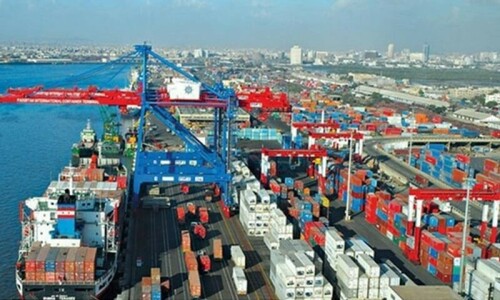The role of finance capital is apparently being redefined by market dynamics. Despite the pickup of private sector credit in recent months, the overall volume is not every exciting.
The improving performance of the economy however does hold out the promise of better credit off-take by the private sector helped by rising Chinese CPEC investment.
But a more important issue is the changing nature of credit demand. For the last six years, financially robust large companies, according to the State Bank of Pakistan, have opted for deleveraging, as indicated by the debt to common equity ratio. Big companies have ‘posted consistently healthy liquidity ratios’ from 2010 to 2015.
The State Bank findings suggest that the large non-finance companies might be engaged in inter-corporate financing for diversifying their business by equity investment in subsidiaries. Cash-rich firms have lower need for bank financing. The chairman of a group of companies says his profit making firms also provide funds to sister concerns when required.
As a proportion of total assets, the long-term investments by private firms during 2009-2014,(to quote The Financial Statements Analysis of Companies by the central bank) rose from an average of 5.4pc during 2009-2012 to 7.4pc in 2014.
For the last six years, financially robust large companies, according to the State Bank of Pakistan, have opted for deleveraging, as indicated by the debt to common equity ratio
So while the banks are generally criticised for being risk averse — for investing in government papers rather than lending to the private sector — it is due also to the slack in credit demand in an area of preferred choice of banks for lending that is one of the main culprits. Trade financing may help improve the bank’s balance-sheet but is not enough to prevent the financial system from a shrinking role in the economy. Banks cannot afford to remain insulated from much of the productive sectors of the economy.
Then there are less capital-intensive or labour-intensive activities where not enough bank borrowing is involved but these are important for banks to step up lending and in the process speed up the document process in the informal economy (not being done efficiently by government). In case of investment in real estate, where some textile tycoons are putting their excess cash, not much borrowing is required, as it is primarily financed by purchasers of offices, shops and flats. This is also somewhat true in case of booking of cars and auto manufacturers but for leasing in a limited way.
Banks need to come up with finance products to play a more active role particularly in the real estate sector as the middle class is being left out of the booming property market. A professional working in Saudi Arabia and visiting Karachi told this scribe that he saved half a million rupees per annum but his savings for last so many years were not enough to buy a plot in the city’s defence society. The prices have surged at faster rate than his savings.
The market demand for credit is also undergoing a change. Capital spending on IT to improve productivity is much lower than in conventional technologies, heavy plants, machinery and equipment. By and large, traditional industries are burdened with excess capacity. And diversification is not fast in products or export markets. In a sluggish economy, the focus had been on consolidation ( rather than expansion) where self-financing was easier. The long-term opportunities lie not so much in capital-intensive activities as in skill-development, technology and innovative pursuits.
Investments made in the formal economy have also become costlier. Here the banks need to have a fresh look at equity investment option and see how it can be combined with lending for fixed investment to cut financial charges of a borrowing company. This would translate into better project appraisals by banks and closer monitoring of running businesses, and no less important, the sharing of risks and rewards more equitably.
The good news is that fixed investment is picking up helped by current interest rates, a better security situation and easing of energy shortage while spurred by moderately growing economy. Yet another positive factor for promoting investment is the relatively stable exchange rate. The volatility of exchange rate distorts the viability of businesses as a fast depreciating rupee makes cost of imported plants and machinery dearer. To keep import costs at affordable levels, investors are induced to retain a portion of their foreign exchange earnings abroad.
Besides, the continuous depreciation of the rupee to boost exports is countered by competitive devaluations by other countries. To remain globally competitive, an economy has to have the latest technologies and innovate, supported by government policies and bank financing. Subsidies on exports only work as a breather not as a permanent solution.
“Going forward” the State Bank says, “the deleveraging trend in particular has increased the potential appetite for credit by non-financial companies.” The potential appetite exists in such areas as SMEs, house finance, agriculture and microfinance, which remain largely under-served by credit where bank profitability is high but expertise at a low. And with so much floating cash in a resilient informal economy, the future role of banks has to be redefined. Commercial banks are generally shy to help document the (informal) economy where space for business is enormous.
Published in Dawn, Business & Finance weekly, August 1st, 2016















































Dear visitor, the comments section is undergoing an overhaul and will return soon.